Verizon touts Android's superiority over iPhone

Every major iteration of Android is named after a pastry (Cupcake, Donut, etc.), and whenever the latest version is being worked on, a giant foam rendition of that pastry is planted on the lawn of Google's headquarters. Last week, a giant eclair, signifying the impending drop of Android 2.0, was unveiled.
This is normally a pretty big event in and of itself, but it happened on the same day that Google had its quarterly earnings call, and CEO Eric Schmidt made the bold statement that "Android adoption is about to explode," without providing too much more detail.
EU puts more than 100,000 historical documents online

While initiatives at various levels of United States government strive to put current documents and publications online for public consumption, the European Union has been keeping up with new documents and scanning its archives to boot.
As a result, the EU Bookshop opened its Digital Library last week, an online repository of more than 110,000 scanned historical EU documents which date all the way back to 1952.
Study: Cable/telco competition brings North America slowest, costliest broadband

Today was the Federal Communications Commission's deadline for public comment on the Berkman Center For Internet and Society's recent study, which examines the growth of broadband Internet access in other countries, along with the factors that have made those markets overseas more competitive than in the US.
"International comparisons...have been a political hot button in the past few years. Because the United States began the first decade of this century with the fourth-highest levels of broadband penetration among OECD nations, and is closing the decade in 15th place in these same rankings, and because, according to International Telecommunications Union measures, the United States slipped from 11th to 17th between 2002 and 2007, many have used these data to argue that the United States, on its present policy trajectory, is in decline," the study says.
US broadcast industry group finally standardizes mobile digital television
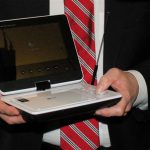
Last night, the Advanced Television Systems Committee (ATSC) unanimously agreed on the final mobile broadcast TV standard, the ATSC A/153 Mobile DTV Vestigial Side Band (VSB). This standard lets broadcasters take a portion of their existing DTV band and rebroadcast it as a shortwave sideband for mobile consumption.
But even in places where mobile broadcast television is popular, such as South Korea, it still isn't that popular. In the United States, where the average household watches more than 8 hours of television per day, mobile television remains as unpopular as ever.
Google to open e-book shop: Does it matter yet?

Today, Google said it will launch its own e-book store in the first half of 2010 called "Google Editions." This store will sell in-print books in addition to its archive of public domain titles, and will be accessible to "any device with a Web browser," not just for the dedicated e-readers that have gained so much notoriety in the past few years. Users will reportedly need to be connected to the Web to initially obtain their books, but they are then cached for offline consumption.
Google has long been expected to enter this space, and did not mention this week with whom it intends to partner in the hardware space. But reading headlines today, you'd think this was the first melee in a full-scale war between Amazon, Barnes and Noble, and Google. Some have called it an "e-book fight," some an "eReader war," and then there was the inexplicably silly "Google wants you dead, Amazon!"
AT&T: Google is an evil empire that must be stopped

Following up on the Federal Communications Commission's continuing investigation into the legality and regulatory positioning of Google Voice, telecommunications giant AT&T addressed the FCC with a document entitled, "The Truth About Google Voice and the Open Internet Principles." (PDF available here, hosted by the Washington Post.) It reads quite like any other publication with a title like "The Truth About..." complete with all the shock and vitriol of a propaganda pamphlet.
AT&T claims that Google needs to stop blocking certain outbound Google Voice calls. Google claims that it blocks certain connections which are too expensive for a free service to connect to; and furthermore, as an Internet-based service, the issue is out of the FCC's jurisdiction anyway.
BlackBerry Storm 2 vs. BlackBerry Storm: The complete specs
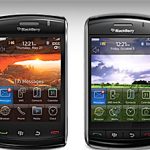
As expected, Research in Motion today released the specs for the BlackBerry Storm 2 (9550), and it really does appear to be mostly the same as its predecessor, except with crucial improvements in the areas that disappointed users most.
BlackBerry Storm 2 (9550) BlackBerry Storm (9530) Size 4.43" x 2.45" x .55" 4.43" x 2.45" x .55" Display 3.25" (480 x 360) capacitive multitouch/gestural 3.25" (480 x 360) capacitive touch Memory 256 MB Flash, 2 GB on-board storage 125MB Flash, (192 MB RAM), 1 GB on-board storage Network Support Dual Band CDMA/EV-DO Rev A., Quad-band GSM/GPRS/EDGE, single band UMTS/HSPA Dual Band CDMA/EV-DO Rev A., Quad-band GSM/GPRS/EDGE, single band UMTS/HSPA Connectivity 802.11b/g/d/i, Bluetooth 2.1 +EDR1) Integrated GPS with A-GPS Capabilities Bluetooth 2.0, Standalone GPS, A-GPS Battery 1400 mAhr Li-Ion, 5-6 hours of talk time, 11.2-12.7 days of standby time 1400 mAhr Li-Ion, 6 hours talk time, 15 days of standby time Imaging 3.2 MP Video/ 2x zoom AF camera with flash and image stabilization 3.2 MP Video/ 2x zoom AF camera with flash WeightVerizon's Storm 2, hopefully with stronger gusts than Storm 1
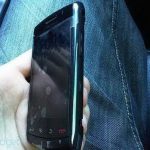
The BlackBerry Storm 2 (also known as "Odin," "9550," or "9520") has been the subject of passing rumors for the last six months. As the purported sequel to Research in Motion's first touchscreen BlackBerry, it looked as though the new device would improve upon the shortcomings of its predecessor without deviating from its familiar style. In other words, it would keep the same chassis shape and trademark "clickable touchscreen," but would give the device more consumer appeal by doing things they actually want, like adding Wi-Fi, improving the interface, and bringing the applications up to par with its competition.
It's not that the original Storm was a slouch by most measurements. But since it was such a great departure from the traditional BlackBerry form factor, its reception among BlackBerry fans was mixed. I personally know four BlackBerry loyalists who bought a Storm and subsequently returned it, citing such reasons as, "It didn't feel right," and "It wasn't what I was expecting."
Wi-Fi Direct aims to be the 'Bluetooth Killer'

Imagine a wireless home network where devices communicate directly with one another instead of through the wireless router -- a sort of mesh network without the need to switch to ad hoc mode. Today the Wi-Fi Alliance announced it has almost completed the standard which could make these a reality: Wi-Fi Direct.
Wi-Fi Direct was known as "Wi-Fi Peer-to-Peer," and has repeatedly been referred to in IEEE meetings as a possible "Bluetooth Killer." By means of this standard, direct connections between computers, phones, cameras, printers, keyboards, and future classes of components are established over Wi-Fi instead of another wireless technology governed by a separate standard.
Acer rings in year 2 of Android with a Snapdragon-based device
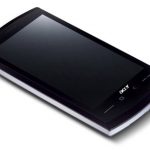
Acer today took the lid off of its first Android-based smartphone, the Liquid, formerly shown off as the "A1." In addition to being the top computer manufacturer's first Android smartphone, it's also the first Android phone based on the 1 GHz Qualcomm Snapdragon chipset.
It's not the first Snapdragon phone altogether -- that honor went to the Windows Mobile-based Toshiba TG01 earlier this year -- but the Liquid will become be the most powerful Android handset available. Sony Ericsson is rumored to also be working on a Snapdragon-based Android phone with a UI known as "Rachael," and HTC is reportedly working on the "Dragon," but neither company has officially debuted a product as Acer has today.
Yet another case for backing up your data: Snow Leopard

Apparently not only are Sidekick users losing their personal data. Now, in a separate incident, Snow Leopard (OS X 10.6) users are also finding their data fully wiped.
The bug was actually discovered within a week of Snow Leopard's launch back in August, when users found that logging out of their account, into a "guest" account, and then back into their personal account would completely erase the content from their home drive (Documents, Movies, Pictures, Music, Sites).
Mandriva Linux 2010 RC2 available now

Download Mandriva Linux 2010 RC2 from FileForum now.
The last development version of Mandriva Linux 2010 RC2 (32 and 64 bit free versions) went live on Saturday, and is now available for testing from our FileForum.
The Sidekick catastrophe: A curse for Microsoft, but a blessing for Motorola?
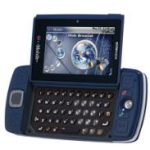
What began last week as a service disruption for T-Mobile Sidekick users devolved into one of the worst calamities in mobile/cloud synchronization thus far. One week after announcing the prolonged disruption, T-Mobile, its Sidekick service provider Danger, and Danger parent company Microsoft alerted users that the disruption had become a complete failure, resulting in the loss of contacts, calendar entries, to-do lists, and photos which users had synced to the network.
The companies only said that the data loss was attributed to "a server failure at Microsoft/Danger," but there have been rumors that it was actually a joint failure of Microsoft and Hitachi when attempting to update the Danger Storage Area Network (SAN), which failed, and no backup had been performed.
FCC demands to know every detail about Google Voice

Yesterday, the Federal Communications Commission launched yet another inquiry into the Google Voice service, this time at the behest of a bi-partisan group of congresspersons who questioned Google's ability to block calls to rural telephone exchanges.
"We understand Google has asserted Google Voice is not a 'traditional' telephone service -- despite its use of 10-digit telephone numbers and its ability to connect calls between telephones through a local exchange carrier," members of the House of Representatives wrote to the FCC on Wednesday. "Instead, Google maintains it ought to be allowed to block calls to rural telephone exchanges -- a position we find ill conceived and unfair to our rural constituents."
Why a Verizon iPhone wouldn't work (for Verizon)

One of the most common remarks you'll see in iPhone-related discussion is the "If iPhone were on Verizon Wireless" comment. Though phrased differently, they're usually the same sentiment...discussing how much better the iPhone experience would be on Verizon, and about how many more people would become satisfied iPhone users.
Most people seem to agree that Verizon Wireless' data network is better.
Tim's Bio
Tim Conneally was born into dumpster tech. His father was an ARPANET research pioneer and equipped his kids with discarded tech gear, second-hand musical instruments, and government issue foreign language instruction tapes. After years of building Frankenstein computers from rubbish and playing raucous music in clubs across the country (and briefly on MTV) Tim grew into an adult with deep, twisted roots and an eye on the future. He most passionately covers mobile technology, user interfaces and applications, the science and policy of the wireless world, and watching different technologies shrink and converge.
© 1998-2025 BetaNews, Inc. All Rights Reserved. About Us - Privacy Policy - Cookie Policy - Sitemap.
